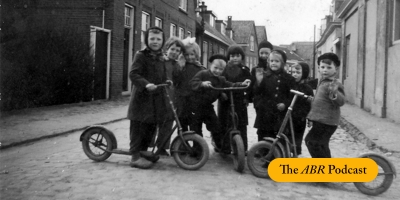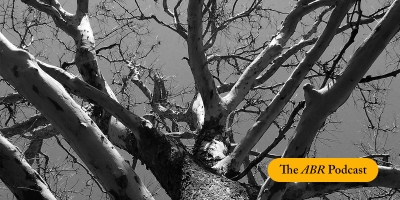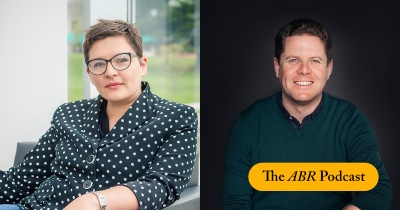Accessibility Tools
- Content scaling 100%
- Font size 100%
- Line height 100%
- Letter spacing 100%
The ABR Podcast
ABR’s Calibre Essay Prize is one of the world’s leading prizes for an original essay. This year, we received a record field of 638 essays. Today we hear from Anita Punton, who placed second for her essay ‘May Day’, a poignant memoir about piecing together her father’s life after his death. Our judges – Sheila Fitzpatrick, Billy Griffiths, and Peter Rose – described Punton’s essay as ‘a rich and moving evocation of a relationship between father and daughter’, one ‘written with humour and flair, offering a complex portrait of Punton’s father: a brilliant, narcissistic man, whose life was full of contradictions.’
... (read more)‘Other biographers write about him as if he were a normal person, not the weirdest man who ever lived.’ So says Frances Wilson, British author of the book Burning Man (Bloomsbury), a radical new biography of the captivating and contentious D.H. Lawrence. Geordie Williamson, who reviewed Burning Man for ABR’s August issue, described it as a ‘meta-biography’ that is ‘lovely on the page, often thrilling in its daring’. In today’s episode, Wilson sits down with ABR Editor Peter Rose to discuss the complexities of writing about the enigmatic Lawrence.
... (read more)In today’s episode, listen to Joel Deane read his review of An Ugly Truth by Sheera Frenkel and Cecilia Kang, an account of Facebook’s meddling in the 2016 US elections that ushered Donald Trump into the Oval Office. Joel Deane argues that despite Zuckerberg’s show of civic-mindedness, Facebook’s data-mining enterprise has always been driven by contempt for its users – a manipulable mass of ‘dumb fucks’, as Zuckerberg once put it.
... (read more)This year, the ABR Elizabeth Jolley Short Story Prize received nearly 1500 entries from thirty-six different countries, a record field. Placed third was ‘A Fall from Grace’ by John Richards. The story is the first work of historical fiction to appear on the shortlist of the Jolley Prize. In today’s episode, listen to the author read ‘A Fall from Grace’, which our judges described as ‘a deliciously enigmatic story, rich in the overtones of the international canon: Balzac, Calvino, Borges. Set in pre-revolutionary rural France, a talented painter’s career receives an unforeseen jolt that simultaneously shadows his life and propels his work from realist proficiency to metaphysical greatness.’
... (read more)In today’s episode, ABR looks back at the winner of the inaugural Calibre Essay Prize in 2007: ‘An Die Nachgeborenen: For Those Who Come After’ by Elisabeth Holdsworth. Holdsworth was born in the Netherlands in the years following World War II. Zeeland, where she grew up, was heavily bombed during the war and later flooded. Her poignant essay is a dialogue with the past, detailing her recent return to the Netherlands, her family’s vicissitudes and suffering during the war, and an unforgettable portrait of her conflicted mother.
... (read more)Recently, for the eleventh time, ABR presented the Elizabeth Jolley Short Story Prize. This year the Prize attracted 1,428 entries, from thirty-six different countries. In a virtual ceremony last night, ABR named Camilla Chaudhary as the winner of this year’s Jolley Prize for her story titled ‘The Enemy, Asyndeton’. The judges – Melinda Harvey, Elizabeth Tan, and Gregory Day – described Chaudhary’s entry as ‘a delightful, nimble story; the characters bristle with life, and the dialogue is crisply rendered’. In today’s episode, listen to Camilla Chaudhary read her story in its entirety.
... (read more)Few books have had as decisive an impact on the history of Indigenous Australian land management as Bruce Pascoe’s Dark Emu. And yet, as Peter Sutton and Keryn Walshe argue in Farmers or Hunter-gatherers?, the foundations upon which Pascoe builds his account of Indigenous agriculture may be shakier than first thought. In his review of Sutton and Walshe’s book, writer and anthropologist Stephen Bennetts assesses not only their criticisms of Pascoe’s claims, but also the surrounding controversy that has turned a scholarly debate into another theatre in a culture war. What this political furore threatens to obscure is the long tradition of Australian anthropological research that has been essential to the legal restoration of Indigenous land ownership.
... (read more)On 4 August 2020, Theodore Ell was living in Beirut, Lebanon, when an explosion erupted at the local port, killing more than 200 people and injuring more than 7,500. Ell and his wife, a diplomat, survived, but were badly shaken. At the encouragement of his close friend Beejay Silcox, Ell turned his experience into the essay ‘Façades of Lebanon’, a harrowing, intimate piece of reportage, and the deserving winner of the 2021 Calibre Essay Prize. In today’s episode, listen to Ell in conversation with Silcox about the inception of his prize-winning work, the balancing act of writing trauma and place, the historical complexities of Beirut, and more.
... (read more)Francis Webb, an Australian poet born in 1925, was widely regarded by his contemporaries as one of the most gifted poets of his generation. His creative output was extensive, despite a troubled life living with a diagnosis of schizophrenia. His first major poem, ‘A Drum for Ben Boyd’, appeared in book form when he was only twenty-two. In today’s episode, listen to ABR’s Sydney theatre critic Ian Dickson read the poem in its entirety.
... (read more)Theodore Ell was living in Beirut, Lebanon, on 4 August 2020 when an explosion devastated the city and shook a nation already teetering on the brink of economic collapse. Ell and his wife, a diplomat, were badly affected, but survived. Ell's essay, 'Façades of Lebanon', intertwines the author's outsider observation of the nation with a harrowing personal experience of the blast. It represents reportage at its best, and is a fitting winner of the 2021 Calibre Prize.
... (read more)









